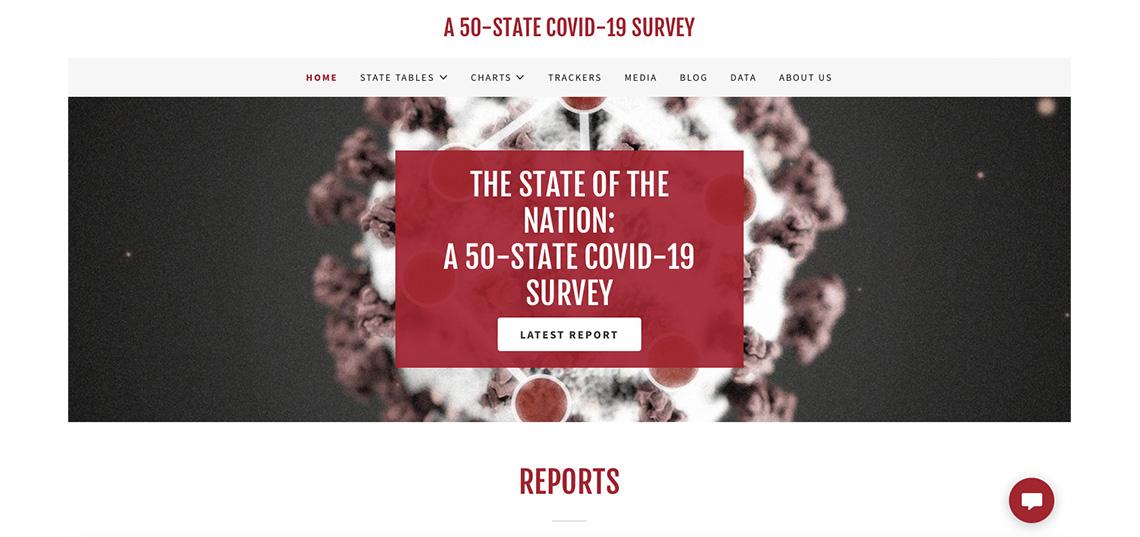
As one of the researchers on “The COVID-19 Consortium for Understanding the Public’s Policy Preferences Across States,” project, Assistant Professor of Communication Katherine Ognyanova is capturing some of the most significant data available revealing the many ways Americans perceive the impact that COVID-19 pandemic has had on the United States.
The significance of the data, Ognyanova said, is that it is a large and important undertaking that they hope can help communities cope better with the impacts of the pandemic.
“We are collecting large-scale longitudinal data from all 50 states to produce a stream of timely and relevant information that we hope will help improve the national response to the pandemic,” Ognyanova said. “We ask questions not only about individuals, but also about their personal social networks and local communities. In addition to surveying over 20,000 respondents in each study wave, we also collect social media data from a panel of consenting respondents. Combining all of that information allows us to better understand the spread of the virus, as well as its health-related, social, and economic consequences. We also seek to evaluate how well the information and communication needs of Americans are met during this crisis. Among other factors, we examine the sources of information and misinformation used by our respondents, their knowledge of critical health guidelines, and their trust in social and political institutions.”
The Consortium’s aim is to serve three main goals, Ognyanova said. “(1) to inform policy-makers in near-real time so they can make better decisions (2) to provide data to epidemiology research tracking the pandemic, and (3) to conduct academic research so we can learn from this crisis and do better in the future. We are sharing data and insights through our website, www.covidstates.org, and communicating directly with local decision-makers. We are especially invested in understanding the impact of this crisis on vulnerable communities who are disproportionally affected by the pandemic as well as by its economic consequences.”
The Consortium is a joint project with:
- The Network Science Institute of Northeastern University
- The Shorenstein Center on Media, Politics, and Public Policy of Harvard University
- Harvard Medical School, Harvard University
- The School of Communication and Information, Rutgers University
- Department of Political Science, Northwestern University
Ongyanova, and her collaborators with David Lazer of Northeastern University; Matthew A. Baum and John Della Volpe of Harvard University; James Druckman of Northwestern University; Roy H. Perlis and Mauricio Santillana of Harvard Medical School, have together published 14 reports, with more to come. (See below for a full list of the reports).
The consortium’s research has been covered in the New York Times, the Washington Post, the Wall Street Journal, USA Today, WIRED Magazine, FiveThirtyEight, and other sources.
Ognyanova said their team came together in March 2020, “driven by the shared concern about the impact of the pandemic on our communities. Network scientists like myself saw the relevance of tracking not only the spread of COVID-19, but also the spread of information and attitudes about the disease through our social networks. Our team includes great methodologists, political scientists, polling experts, as well as leading medical researchers. While our findings give us numerous causes for anxiety and concern, launching this collaboration was a great opportunity to pool our expertise and resources in ways that could really help make a difference.”
This project is supported by the National Science Foundation under grants SES-2029292 and SES-2029297. Any opinions, findings, and conclusions or recommendations expressed here are those of the authors and do not necessarily reflect the views of the National Science Foundation.
Click here to read the 47 reports released by The COVID-19 Consortium for Understanding the Public’s Policy Preferences Across States project (as of April, 2021).
More information about the Communication Department at the Rutgers School of Communication and Information is on the website.
Image credit: Covid States Project
